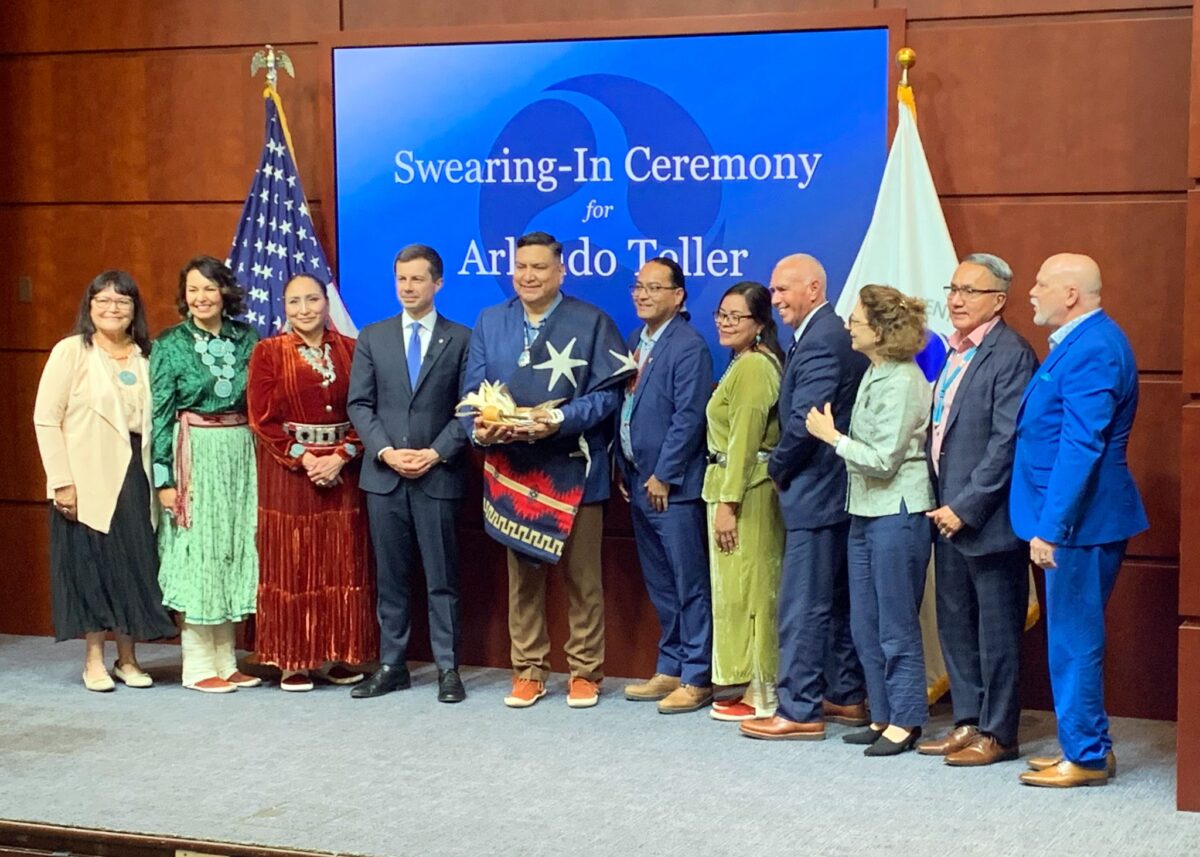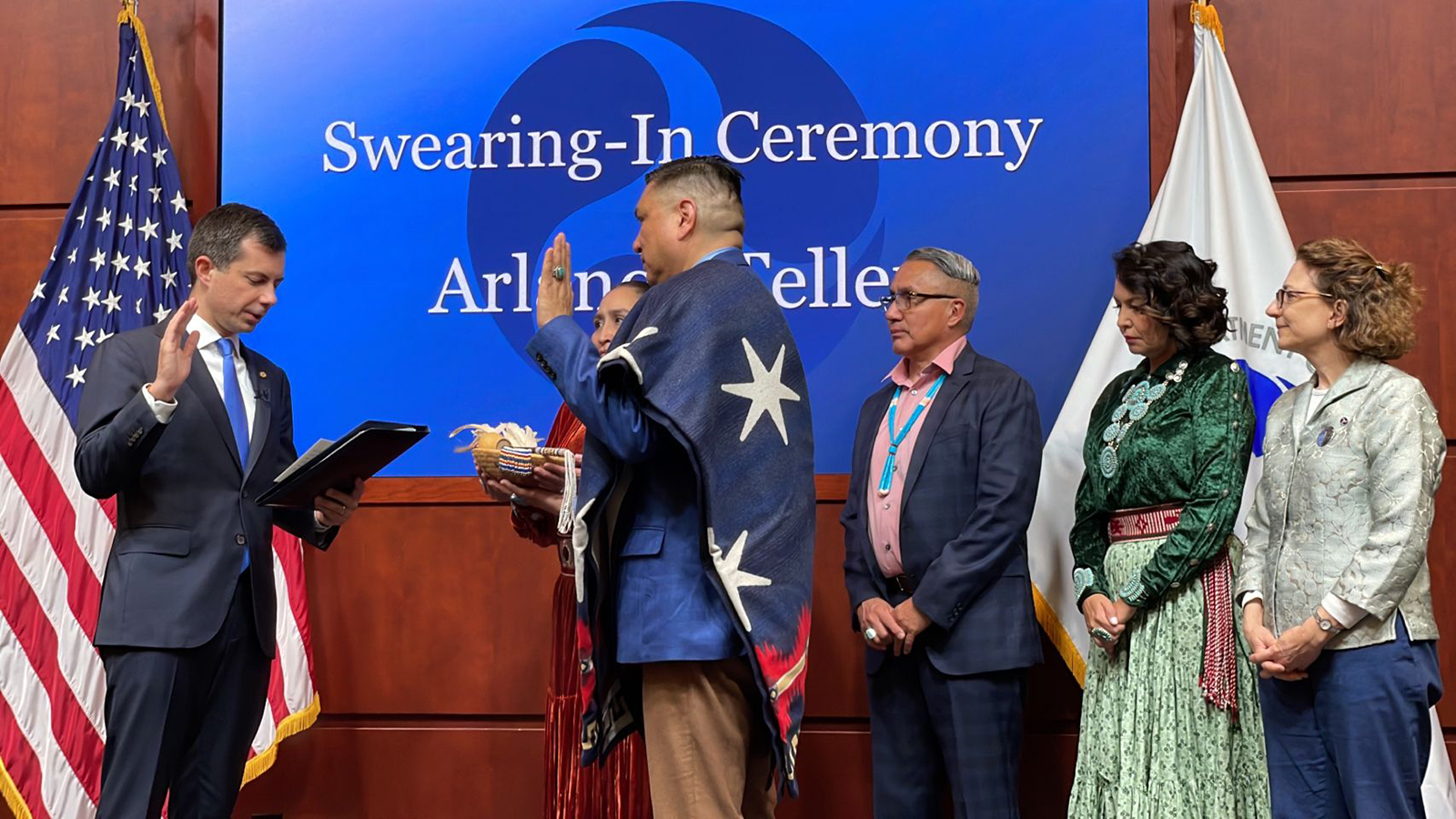When Arlando Teller (’95) was sworn in as Assistant Secretary for Tribal Affairs by Secretary of Transportation Pete Buttigieg, he incorporated a touch of Navajo culture that was also Embry-Riddle symbolism. He held eagle feathers and took his oath holding a Navajo basket in place of the Bible or the Constitution.
Among the spectators in the front row was a fellow Eagle, Executive Director of Engagement Initiatives Bill Thompson (’87), a close friend and mentor to Teller since his student days at Embry-Riddle in Prescott, where he earned his Bachelor of Science in Aviation Business Administration.
Teller has held a Deputy Assistant Secretary position since February 2021. His career has encompassed transportation planning positions and two years in the Arizona House of Representatives, from 2019 to 2021. He has maintained a close relationship with Embry-Riddle throughout his career and was a commencement speaker at Prescott in 2019 and named to the Chancellor’s Hall of Fame.
We had the opportunity to chat with Teller before he was sworn in on May 8, 2023. The conversation is edited for length and clarity.
Congratulations on your new role at the Department of Transportation. That’s a long way from your first job at Falcon Field in Mesa, Arizona.
Oh, my goodness. A long way from Chinle, Arizona. Right?
What took you from Chinle, Arizona, to Embry-Riddle’s Prescott Campus?
When I was 10 or 12, I was herding sheep for my grandmother, and I would see airplanes overhead and my imagination would run wild. Where were all those people going? Later, at Chinle High School, I met an Embry-Riddle recruiter at Career Day. When I got home, I filled in my application immediately.
You were the first college student in your family?
Yes, I had scholarships, but they weren’t enough to cover full tuition. My mother sold three of our prize quarter horses, which we used to race. It was a tough decision.
As a graduate, you brought other Navajo students to campus for summer camps. Why was that important to you?
I knew it was imperative to introduce tribal kids to industry, especially aviation, where there was a lot of interest and opportunity. I was so happy to do that. I also introduced legislation in Arizona to allow graduating high school students to wear tribal regalia, which some schools did not allow.

How do you remember your Embry-Riddle experience?
That atmosphere — the school’s energy — was quite favorable to me. My whole experience was the most amazing time. That’s why keeping engaged is so important to me. My family and friends know that Embry-Riddle is definitely where my heart is.
And a fellow Eagle will be there when you are sworn in?
Yes. Bill Thompson has been an important mentor to me, personally and professionally, since I was a student. In fact, he shared the job posting that got me that first job at Falcon Field Airport. Over the years, he has been such a wonderful family friend. He knew my late mother and my late grandmother, and they loved him, too.
How did you get involved with the Biden Administration?
I was an Arizona state representative. During the last presidential election, I was active in Julián Castro’s campaign, co-drafting his Indigenous Peoples white paper. He dropped out. Michael Bloomberg knocked on my door, and I got voices out there to Native Americans for Bloomberg. He dropped out. When Elizabeth Warren knocked on my door, I said, “I have had two horses in the race, and they both dropped out. I am not going to get involved.” Then, Biden’s people called and asked if I would introduce Cher at a special campaign event in Phoenix. I was flabbergasted. I opened for Cher! I introduced her and thanked the volunteers, speaking from my heart.
Not your standard job interview.
No! I was driving back to Chinle from Phoenix when I got a call from a Biden staffer who asked, “If you were at DOT, what would you do?” It was as if I was prepared for the question somehow. I started talking about improvements to transportation modes, airports, roads, bridges, culverts, resources, technical assistance. I just went down the line. When I told my mom about the call, she said, “That was an interview, and you just got a job with the Biden Administration.”
Soon after, you suffered a major setback?
I got Covid and was hospitalized for two months. My mom got Covid from me and died four days later while I was in the hospital. I had just been re-elected as state representative for Legislative District 7, so I got sworn in right after I got out of the hospital and dragged an oxygen tank around to all my meetings. I didn’t really have time to sit down and mourn.
On January 28, I was on the floor of the State House for a vote when I got the call offering me the new position of Deputy Assistant Secretary for Tribal Affairs. I accepted. As soon as I got off the phone, I pressed my “request to speak” button, stood up and was recognized by Speaker Rusty Bowers. I tendered my immediate resignation. Rusty is a phenomenal friend, he loved my mother even more. I said to him, “Today is Mom’s birthday.”
We typically think of transportation as related to economy. Do you think it’s also related to social justice?
Oh yes, definitely. Transportation is how community members get to where they need to go — work, school, church, to visit family. Anytime we leave our homes, our families and pets expect us to return to them. Safe travel is important to everyone every day.
What are your priorities in your new role?
My top priority is to engage with the tribal nations. There are 574 tribes. We need to communicate early and often and respect their input. There are roads and bridges that need to be replaced. In villages in Alaska, they rely on airports and ferries, as well as roads. We need to make sure tribal nations receive technical advisement on grant opportunities, particularly with the Bipartisan Infrastructure Law. We need to help all tribes, large and small, gaming and non-gaming, navigate the process. I am building capacity within my office at Tribal Government Affairs to do that. And my office works for the Secretary, so I work with colleagues at the Federal Aviation Administration, Federal Highway Administration, Maritime Administration, Federal Transit Administration. We all collaborate to pivot and address different modes of transportation.
What are your personal goals?
I want to keep humble as I work with the tribes. I want to demystify government and the Department of Transportation specifically. I want to make myself accessible. I often give my personal cell number to tribal leaders. I want them to know I am available. But personally, I want my three grandsons, Eli, Kai and Grayson, to share that their “PapaLando” was a good man who helped Tribal communities. The same way I share my late grandfather was a Navajo Code Talker. I share Grandpa Tah’s stories with pride.
How does it feel to go from a kid on the rez to a presidential appointee?
I recall once while at a donor event, prior to this job, I’m sitting among billionaires and millionaires. I remember having the best time at this dinner, talking with this statuesque woman, and then I found out she was Muhammed Ali’s wife. Though I was completely surprised but when I can make people laugh and feel comfortable with who I am, it’s good.
Do you have future political aspirations?
That is an option. I have to consult with my family, my sister and uncle.
And maybe your mother?
That crazy lady guided me to this point, and I will always love her for it. She always said I would get that next position. My wonderful Mom has been guiding me even while she is on her next journey.
